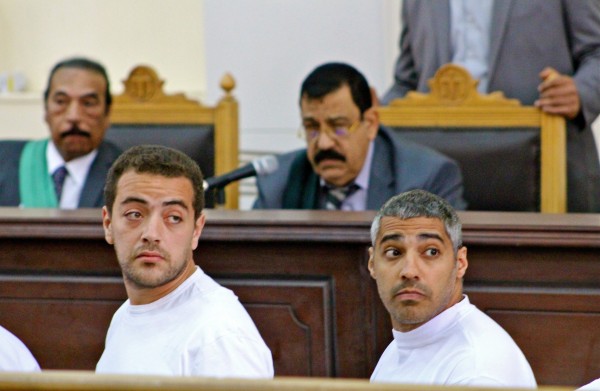Our Silence is Facilitating Oppression in Egypt
MCT
Cameraman Baher Mohamed, left, and Mohamed Fadel Fahmy, the Cairo bureau chief for al Jazeera English, look at reporters sitting behind them Monday, March 31, 2014, as Judge Mohamed Nagy listens to the defendants’ complaints about the conditions they are being held in. Three Al Jazeera journalists, including Australian Peter Greste (not pictured) are standing trial on terror charges. (PHOTO COURTESY OF AMINA ISMAIL/ TNS)
September 10, 2015
Recently, the hashtag #FreeAJStaff went viral following the sentencing of Al Jazeera journalists. Egyptian Baher Mohamed and Canadian national Mohamed Fahmy were sentenced to three years in prison after they were accused of “spreading false news” and airing biased coverage. It is obvious that the verdict was motivated by political interest and was not about bringing justice. The trial of the Al Jazeera journalists has placed the Egyptian government under a spotlight for their oppressive suppression of dissent, while the United States merely witnesses in silence.
Human rights lawyer Amal Clooney, who is representing Fahmy in the case, said that the verdict sends a “dangerous message that there are judges in Egypt who will allow their courts to become instruments of political repression and propaganda,” which not only affects Egypt, but also the rest of the Middle East. Even though Egypt is the United States’ most important ally in the region, this case doesn’t seem to concern us as much as it should.
The recently-released detailed ruling published by the Middle East News Agency (MENA), which is run by the Egyptian government, said that Mohamed, Fahmy and Australian journalist Peter Greste are default members of the banned terrorist organization known as the Muslim Brotherhood. “It has been proven beyond reasonable doubt that the Al-Jazeera media channel has dedicated its broadcasting to the service and support of the Muslim Brotherhood faction and that they have permanently sided with them at the expense of their media ethics,” the ruling said. “This provides enough ground for a conviction of belonging to a group based on violations of the law.”
But clearly, the United States’ priority isn’t to take action on behalf of the Al Jazeera journalists and set the record straight, nor does it seem that this is even an item on our agenda.
Back in 2013, Mohamed and Fahmy had been falsely charged with “aiding a terrorist organization,” the Muslim Brotherhood. Perhaps it was because Al Jazeera was reporting the Rabaa Square protests, in which el-Sisi had ordered a mass killing of more than 1,150 protesters, which Human Rights Watch documented and called “the world’s largest killings of demonstrators in a single day in recent history.” Mohamed and Fahmy, who were on bail ahead of the verdict after spending more than 400 days in detention, have once again returned to Tora prison. Additionally, Greste, who was deported to his home country under a law that allows the transfer of foreigners on trial to their home country following his detention, was retried on the same charges in absentia. After the army overthrew former President Mohammed Morsi in 2013, Egyptian authorities revoked the license of Al Jazeera’s Egyptian channel and forced it to shut down. There has been a heavy crackdown on journalists and voices of dissent since President Sisi seized power in an effort to “end terrorism” and what he believes is Islamic insurgency. This repression of the media and political opposition shows that “journalists can be locked up for simply doing their job, for telling the truth and reporting the news,” as claimed by Clooney.
Even though the United States has denounced Egypt’s new counterterrorism law and is worried about the effect that it would have on human rights in the country, it hasn’t done much to take action. In fact, after Secretary of State John Kerry visited Egypt in early August to meet with Sisi, he said that the United States’ relationship with the Middle East is returning to a “stronger base.” In order to honor the relationship, the United States had generously agreed to provide the Egyptian military with eight F-16 fighter jets this past July, and four more during the fall, to fight terrorism and Islamic Fundamentalism. But clearly, the United States’ priority isn’t to take action on behalf of the Al Jazeera journalists and set the record straight, nor does it seem that this is even an item on our agenda. With a verdict like this, there doesn’t seem to be any room for journalists who actually want to do their jobs, and their lives are placed in danger because the government fears their existence.
I think that President Obama needs to meet with Sisi in order to discuss the concerns of human rights organizations and the international community, which include media repression. Following the Egyptian Revolution, Egyptians used to take to the streets as a method of saying “enough is enough,” but the protest law which went into effect in 2013 illegalizes the gathering of more than five people without consent from government authorities. Those who protest will receive prison sentences and heavy fines. So now, the only method that Egyptians used to bring about honest change is banned. The United States needs to reassess which countries we give aid to and what kind of aid we give—especially when those countries have violated the basic natural rights of their citizens.










